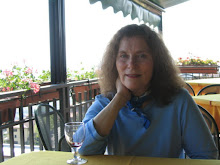(Before reading this entry, you might want to take another look at my post of August 16, 2009. It describes how Cee-Cee, a retired policewoman, introduced herself to me over the phone and proceeded to flog me like a racehorse for what she considered an incredibly stupid letter-to-the-editor I'd written. By the end of the call we'd stopped screaming at each other, more or less, and I'd said we should meet some time over a glass of good red.)
Cee-Cee and I did meet at a Middle Eastern restaurant which had beautiful rugs on the walls and belly-dancing music, and we did have that glass of red wine. And it was so good we had a few more. It was on her fourth glass that she told me a surefire way she'd discovered, during her career, of spotting the rare bad cop, complete with an example.
"Cops like to be right. Not one of us enjoys admitting to a mistake, especially if it was a big, fat, stupid one. But a good cop will admit it, at least to himself. He'll feel shame and regret. He'll do what he can to make it right, and move on.
"A bad cop will never admit to a mistake unless he's driven to it, kicking and screaming." Here Cee-Cee gave the example of an officer she called Leroy, "because it's not his real name." She spoke for half an hour about a case he'd been involved in. His surveillance included shadowing his suspects on flights and several stays in pleasant domestic cities, at countless meals in good restaurants, the theater, on one occasion the opera, as well as wire-taps and invaded email accounts. After all of this, an unthinkable disaster occurred: the suspects turned out to be innocent. And not only were they innocent, they were as clean as Ivory soap. They had never committed a crime.
"So here we've got Leroy, who should have figured this out after a few months at most. We began to realize he may have falsified information. He liked that cushy investigation. He cost us tens of thousands of dollars, hundreds and hundreds of manhours, he made fools of other officers who trusted him, and by far the worst of it, he caused suffering to the innocent. That's the exact opposite of what we're supposed to be doing. And to this day, Leroy has never admitted he made a mistake.
"Yes, suspects are usually guilty, but once a cop starts assuming that they ALWAYS are, he's in trouble. Every once in awhile, the sonsabitches are innocent. Tormenting an innocent person is the worst thing a cop can do, and the good ones know it. But a bad cop like Leroy will be mad at the innocent. He thinks they did it on purpose to make him look bad. He'll make them suffer, if he can. He'll even put them in danger, if he can. Because if he's arrogant AND druggy, like Leroy, there's no boundaries for him."
I asked, "What happened to him?"
"Oh, we got rid of him. We let him retire young." She swirled wine in her glass, looked at it thoughtfully. "I know I talk a lot of trash about civilians, complain that we have to protect them like babies, but after all, it is all about the goddamn civilians. What else is our job about, except to help all you dumb shit-fer-brains civilians out there live your lives, pursue your happiness, you know?" Then she smiled at me, and drank down the last of her wine.
TO BE CONTINUED
Subscribe to:
Post Comments (Atom)

That's probably a good rule of thumb for spotting good or bad people in general, not just cops.
ReplyDeleteYes, I agree with you, Professor.
ReplyDelete